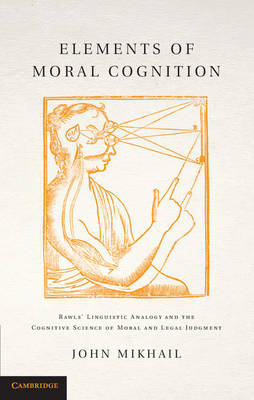
Elements of Moral Cognition
Rawls' Linguistic Analogy and the Cognitive Science of Moral and Legal Judgment
Seiten
2011
Cambridge University Press (Verlag)
978-0-521-85578-5 (ISBN)
Cambridge University Press (Verlag)
978-0-521-85578-5 (ISBN)
This book explores whether the science of moral cognition is usefully modelled on aspects of Noam Chomsky's theory of Universal Grammar. Just as Chomsky argued that human beings are born with innate knowledge of grammar, so Mikhail suggests that humans might possess innate moral knowledge, and how this question can be investigated.
Is the science of moral cognition usefully modelled on aspects of Universal Grammar? Are human beings born with an innate 'moral grammar' that causes them to analyse human action in terms of its moral structure, with just as little awareness as they analyse human speech in terms of its grammatical structure? Questions like these have been at the forefront of moral psychology ever since John Mikhail revived them in his influential work on the linguistic analogy and its implications for jurisprudence and moral theory. In this seminal book, Mikhail offers a careful and sustained analysis of the moral grammar hypothesis, showing how some of John Rawls' original ideas about the linguistic analogy, together with famous thought experiments like the trolley problem, can be used to improve our understanding of moral and legal judgement.
Is the science of moral cognition usefully modelled on aspects of Universal Grammar? Are human beings born with an innate 'moral grammar' that causes them to analyse human action in terms of its moral structure, with just as little awareness as they analyse human speech in terms of its grammatical structure? Questions like these have been at the forefront of moral psychology ever since John Mikhail revived them in his influential work on the linguistic analogy and its implications for jurisprudence and moral theory. In this seminal book, Mikhail offers a careful and sustained analysis of the moral grammar hypothesis, showing how some of John Rawls' original ideas about the linguistic analogy, together with famous thought experiments like the trolley problem, can be used to improve our understanding of moral and legal judgement.
John Mikhail is Associate Professor at the Georgetown University Law Center.
Part I. Theory: 1. The question presented; 2. A new framework for the theory of moral cognition; 3. The basic elements of Rawls' linguistic analogy; Part II. Empirical Adequacy: 4. The problem of descriptive adequacy; 5. The moral grammar hypothesis; 6. Moral grammar and intuitive jurisprudence: a formal model; Part III. Objections and Replies: 7. R. M. Hare and the distinction between empirical and normative adequacy; 8. Thomas Nagel and the competence-performance distinction; 9. Ronald Dworkin and the distinction between I-morality and E-morality; Part IV. Conclusion: 10. Toward a universal moral grammar.
| Erscheint lt. Verlag | 13.6.2011 |
|---|---|
| Verlagsort | Cambridge |
| Sprache | englisch |
| Maße | 152 x 229 mm |
| Gewicht | 800 g |
| Themenwelt | Geisteswissenschaften ► Philosophie ► Ethik |
| Geisteswissenschaften ► Philosophie ► Logik | |
| ISBN-10 | 0-521-85578-0 / 0521855780 |
| ISBN-13 | 978-0-521-85578-5 / 9780521855785 |
| Zustand | Neuware |
| Haben Sie eine Frage zum Produkt? |
Mehr entdecken
aus dem Bereich
aus dem Bereich


